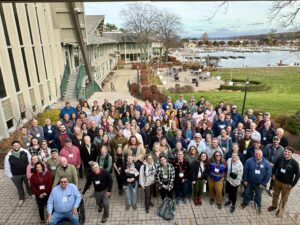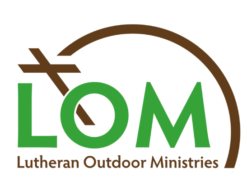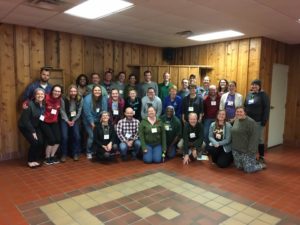
2016 Leadership Training Event Class
A Brief History of Lutheran Outdoor Ministries (the organization).
For a history of outdoor ministry in general, written by David Garner, visit http://www.outdoorlessons.org/2017/05/the-nearly-unabridged-history-of.html
READ SOME OF THE HISTORY!
History Lutheran Camping, 1919-1949 – by Mark Burkhardt
History Lutheran Camping, by Ralph Yernberg, Volume 1
History Lutheran Camping, by Ralph Yernberg, Volume 2
1988: The Lutheran Church in America and American Lutheran Church merge to create the Evangelical Lutheran Church in America (ELCA). This merger brings Lutheran camps across the country together, and includes 2.5 executive staff in the churchwide offices. The ELCA is divided into nine regions geographically. Outdoor Ministry sites have a history of gathering together with other camps and retreat centers in their respective region. Camp professionals often gathered for regional events over the ELCA’s history to share ideas, network, and bring in speakers to engage in timely topics in outdoor ministries. The Association of Lutheran Outdoor Ministry Professionals (ALOMP) is formed as a professional organization focused on training, supporting, and developing professionalism for those working in Outdoor Ministries. It also provided a way for professionals to elect their representatives to the ELCA Outdoor Ministry Advisory Committee. ELCA Outdoor Ministries produces a summer camp curriculum.
1989: The annual conference is held at the Ozarks, Missouri.
1990: The annual conference is held at Life Enrichment Center, Leesburg, Florida
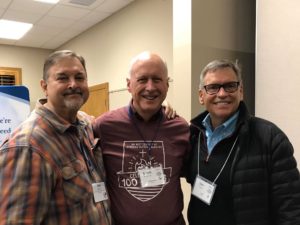 1991: ELCA Outdoor Ministries begins the International Camp Counselor Program. The fall conference saw ALOMP nearly voted out of existence since it seemed to be purposeless. Lutheran Outdoor Ministry professionals Paul Kehnle, Randy Gullickson, and Don Johnson (on the strength of his interest and involvement in the American Camp Association) began the task of re-visioning the Association of Lutheran Outdoor Ministry Professionals (ALOMP) by generating a list of the best things that associations do for their membership. Their conclusion was that at the top of the list are networking and education. At that point, creating quality educational opportunities became the prime objective. The ALOMP School was conceived of, designed, and intended to provide new directors, or those who are contemplating outdoor ministries as a career, with (1) the basic knowledge that they need to get started, (2) an awareness of what it is that directors need to know…and therefore, an awareness of their own weaknesses so they can self-direct their development, (3) a connection to peers, (4) a connection to ALOMP through faculty and the conference, and (5) a connection with a mentor. The annual conference is held in Chicago.
1991: ELCA Outdoor Ministries begins the International Camp Counselor Program. The fall conference saw ALOMP nearly voted out of existence since it seemed to be purposeless. Lutheran Outdoor Ministry professionals Paul Kehnle, Randy Gullickson, and Don Johnson (on the strength of his interest and involvement in the American Camp Association) began the task of re-visioning the Association of Lutheran Outdoor Ministry Professionals (ALOMP) by generating a list of the best things that associations do for their membership. Their conclusion was that at the top of the list are networking and education. At that point, creating quality educational opportunities became the prime objective. The ALOMP School was conceived of, designed, and intended to provide new directors, or those who are contemplating outdoor ministries as a career, with (1) the basic knowledge that they need to get started, (2) an awareness of what it is that directors need to know…and therefore, an awareness of their own weaknesses so they can self-direct their development, (3) a connection to peers, (4) a connection to ALOMP through faculty and the conference, and (5) a connection with a mentor. The annual conference is held in Chicago.
1992: The annual conference is held at Asilomar Conference Center, Pacific Grove, California.
1993: The annual conference is held at Lake Louise Inn, Lake Louise, Alberta, Canada. Between 1991 and 1994 there were numerous conversations involving Mark Burkhardt, ELCA Director for Outdoor Ministries, Don Johnson, Randy Gullickson and others who had participated in training events in the pre-ELCA church bodies, regarding the development of ongoing education. Noting high turnover among staff in Outdoor Ministries, solid education for directors was set as the highest priority. Responding to the age-old complaint of veteran directors that the conference content was not challenging enough and only the networking was of any value to them, was the second priority. The basic model adopted for the ALOMP School was the ACA’s New Director Training program with its idea of focusing on “core” areas. Outdoor Ministries in the ELCA’s predecessor organizations had provided sporadic training for new directors with content that addressed theology, polity, faith development and other Lutheran church camping essentials. It was decided to draw from both curricula to build a new school in order to give new directors the “100 level” essentials they needed to get off to a good start. The solution for veteran directors who wanted more substance was to design the educational content of Outdoor Ministry Conferences around the core competency areas defined as essential for successful and effective outdoor ministry. Beyond that, for the good of all, the Education Committee was to encourage and promote “Intensives,” “White Paper” studies, opportunities such as the Environmental Education event, the Executive Leadership event, and the ALDE conference, which focus on specific areas of concern. These conversations provided the concepts that became the substance of the working documents presented to the ALOMP at the 1994 Outdoor Ministries Conference.
1994: Jerry Olstad steps down as Director of ELCA Outdoor Ministries; Mark Burkhardt assumes this position. Outdoor Ministries loses one executive staff position in the churchwide office due to cutbacks. Strategic planning process begins for camping network. The Outdoor Ministry Advisory Committee makes ALOMP responsible for its own fall conference. The annual conference is held at Ridgecrest Conference Center, Asheville, North Carolina. Conversations begin regarding proposals to be offered to ALOMP to begin providing services to members if more cutbacks at the ELCA churchwide offices are made. The Co-Executive Director of the Division for Congregational Ministries speaks at fall conference, encouraging the association to prepare to take more responsibility for our welfare as future support from churchwide resources is not guaranteed. ALOMP adopted the working policy documents: “Regularized Continuing Education” and “Three Track.” These documents established the “New Directors” and “New Program Directors” schools, the initial core competency areas, the guidelines for developing each school, and encouraged the development of other “regularized” events. White Papers and Intensives were concepts introduced later and were not formalized in policy. In addition to adopting the documents, ALOMP (as noted on the bottom of the “Regularized Continuing Education” document) instructed the president to immediately establish the Education Committee and get the process started so that the first school could be offered in 1995. The first Education Committee was recruited immediately after the conference and work began in January. The first committee was comprised of: Don Johnson (chair), Andrea Scofield, Keith Johnson, Roberta Wentworth, and Marianne Wilkinson.
1995: The Education Committee met in Chicago in January to plan the first school. At that meeting the name of the school was changed to, “ALOMP School: [Administrative or Program] Track” so that people who had been in Outdoor Ministries positions for a while, but who felt they needed the school, would not be put off by the word, “new.” The first school, an “Administrative Track” was offered just prior to the conference in 1995. At the outset there was concern by everyone in the dreaming and planning process that, after a couple of cycles of schools, everyone who needed or wanted to attend would have done so and the market would thin. It was theorized that if that were the case, the schools would be offered less frequently based on need. The actual scenario came together quite differently as the participation in the school grew steadily which has led to waiting lists. The demand for the school has witnessed to the need for the school and to the school’s success in meeting the needs of the people. The annual conference was held at Scarritt Bennett Center, Nashville, Tennessee.
1996: The annual conference is held at Marriott Hotel, Beaver Creek, Colorado
1997: The annual conference is held at Rowleys Bay Resort, Door County, Wisconsin
1998: ELCA Outdoor Ministries returns to 2.5 executive staff in the churchwide office. The annual conference is held at the Chautauqua Institution, Chautauqua, New York.
1999: The annual conference is held at T Bar M Conference Center, New Braunfels, Texas.
2000: The annual conference is held at Hallmark Resort, Cannon Beach, Oregon
2001: The annual conference is held at Congress Hotel, Chicago, IL.
2002: The annual conference is held at Springmaid Beach, Myrtle Beach, South Carolina.
2003: The annual conference is held in Medora, North Dakota. News is shared that the ELCA is planning restructuring and staff positions in ELCA Outdoor Ministries may be cut.
2004: Continuing conversations about how ALOMP and the network can become more self-sufficient and less dependent on the ELCA lead to the proposal of forming a new entity. This new organization would be incorporated as a 501(c)3 and eventually move toward the ability to provide those services currently provided by the ELCA Outdoor Ministries staff in the churchwide office. Participants at the annual ELCA Outdoor Ministries conference, held at Snowbird Resort, Utah, vote to form a new organization, adopt a working set of Policies and Procedures, and begin transitioning from the ELCA Outdoor Advisory Committee to its own Board of Directors. Duane Hanson and Ralph Yernberg are elected the first Co-Presidents of Lutheran Outdoor Ministries. Lutheran Outdoor Ministries (LOM) continues to work with ELCA Outdoor Ministries staff. LOM seeks to define, develop, and grow its existence and offerings to ELCA camps and outdoor ministry organizations. The organization is largely dependent on volunteers to make things happen as there are no funds to hire staff or consultants. As ALOMP and the Outdoor Ministries Advisory Committee were disbanded and Lutheran Outdoor Ministries (LOM) was being envisioned, the organization went through the process of Appreciative Inquiry. In this process, only the things that were best in the organization – those things that are most important – were brought into the new organization. Through questionnaires, evaluations, and interviews, there continued to be resounding support of education and specifically the Outdoor Ministries Schools. Over the years, the core competencies have changed very little. Through trial and error and a lot of evaluation, most of the classes taught are still those originally envisioned. The Education Committee felt it was important for the schools to provide an entry-level overview of the classes from the standpoints of administration and program.
2005: The name of the ALOMP Schools are changed to Leadership Training Events – Program and Administrative. The annual conference is held at the Edgewater Hotel, Duluth, Minnesota.
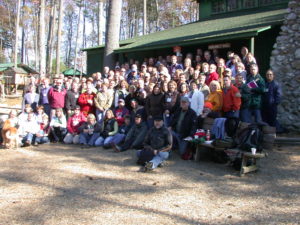
The group photo of the 2006 conference, taken on the day participants traveled to Camp Nawakwa.
2006: The annual conference is held at the Eisenhower Conference Center, Gettysburg, PA. “Field trips” were taken to Camp Nawakwa and the Lutheran Theological Seminary at Gettysburg. Participants also could chose to spend their free time at the National Battlefield.
2007: The annual conference is held at the Mohican State Park, Loudonville, Ohio.
2008: The annual conference is held Zephyr Point, Lake Tahoe, Nevada, and is held jointly with the Presbyterian Camp and Conference Center Association (PCCCA).
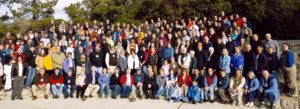
2009: The annual conference is held at Camp Allen, Navasota, Texas.
2010: The Evangelical Lutheran Church in America eliminates Outdoor Ministries staff and program at the churchwide office in October. The annual conference is held in November at Xavier Retreat and Conference Center, Convent Station, New Jersey.
2011: LOM plans and executes the first LOM Annual Conference, held at Honey Creek Resort State Park, Moravia, Iowa. LOM signs contracts with two independent contractors to assist the organization with administrative functions. The LOM Administrator (Wayne Harrison) assists with maintaining the member’s database, conference registration, and other administrative duties; the LOM Events Coordinator (Jon Skogen) assists the Annual LOM Conference planning committee, with the administrative aspects of the annual conference, as well as working with the Education Committee to plan the Leadership Training Events and work with logistics and administration of these events.
2012: The first LOM curriculum is published. The LOM Board moves to contract with one person (Jon Skogen) to fulfill the duties of the LOM Administrator and LOM Events Coordinator. The annual conference is held at Coeur d’Alene Resort, Coeur d’Alene, Idaho, where the first Innovative Program Award is presented.
2013: The LOM Board moves to contract a bookkeeper. Susan Troutman fills that role. Randy Youngquist-Thurow takes over as events coordinator. The annual conference is held at Zephyr Point, Lake Tahoe, Nevada, and is hosted jointly with the Presbyterian Camp and Conference Center Association (PCCCA) for a second time.
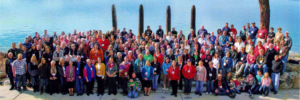
2014: The LOM Board moves to contract a webmaster to handle web duties. Chad Hershberger fills that role and begins in November. Susan Troutman concludes her service as bookkeeper and Aurice Worley is contracted to fill that position. The annual conference is held at Heartwood Center, Trego, Wisconsin.
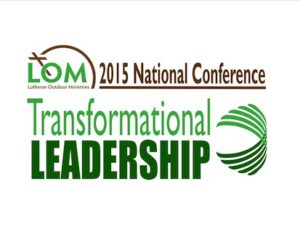 2015: Don Johnson is hired as LOM’s first executive director, beginning on August 17. The annual conference is held at Lutheridge Conference Center, Asheville, North Carolina.
2015: Don Johnson is hired as LOM’s first executive director, beginning on August 17. The annual conference is held at Lutheridge Conference Center, Asheville, North Carolina.
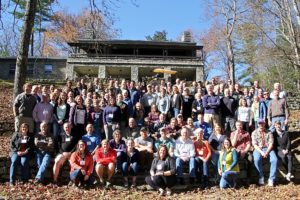
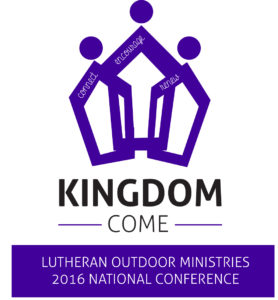
2016: The annual conference is held at Carol Joy Holling Conference and Retreat Center, Ashland, Nebraska, under the theme, “Kingdom Come,” with about 140 in attendance.
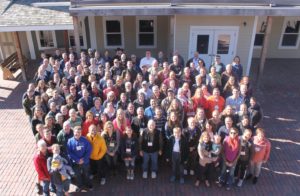
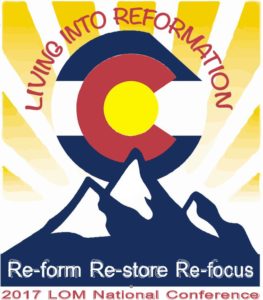 2017: The annual conference is held at Beaver Run Resort in Breckenridge, Colorado, under the theme, “Re-form, Re-store, Re-focus,” with about 140 in attendance. This was the first year the Manlove-Howells Leadership Award was given and it was presented to its two namesakes. At its January 2017, the LOM Board officially voted to extend a permanent call to Don Johnson as the organization’s first executive director. The decision was based on overwhelmingly positive feedback after the board asked for reflections on his first years in the job. Also at that meeting, the board unanimously approved a new strategic plan. In early September, LOM launched a new website after nearly a year of development. As part of the new website development, two LOM databases were consolidated. A new Journeys for Youth website was also unveiled. The LOM curriculum for 2018 was unveiled during Fall 2017. For the first time, the curriculum has the same title as the theme for the ELCA Youth Gathering. It was written in collaboration with the gathering team. A retreat to help church leaders and LOM professionals in being more inclusive was held in September at Carol Joy Holling in Nebraska. The purpose of the event was to guide participants in best practices for ministry with youth, young adults and their families that identify as LGBTQ. Read the Executive Director’s Report for this year.
2017: The annual conference is held at Beaver Run Resort in Breckenridge, Colorado, under the theme, “Re-form, Re-store, Re-focus,” with about 140 in attendance. This was the first year the Manlove-Howells Leadership Award was given and it was presented to its two namesakes. At its January 2017, the LOM Board officially voted to extend a permanent call to Don Johnson as the organization’s first executive director. The decision was based on overwhelmingly positive feedback after the board asked for reflections on his first years in the job. Also at that meeting, the board unanimously approved a new strategic plan. In early September, LOM launched a new website after nearly a year of development. As part of the new website development, two LOM databases were consolidated. A new Journeys for Youth website was also unveiled. The LOM curriculum for 2018 was unveiled during Fall 2017. For the first time, the curriculum has the same title as the theme for the ELCA Youth Gathering. It was written in collaboration with the gathering team. A retreat to help church leaders and LOM professionals in being more inclusive was held in September at Carol Joy Holling in Nebraska. The purpose of the event was to guide participants in best practices for ministry with youth, young adults and their families that identify as LGBTQ. Read the Executive Director’s Report for this year.
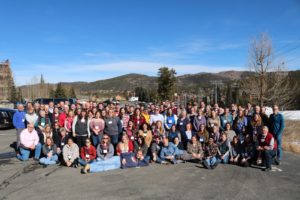
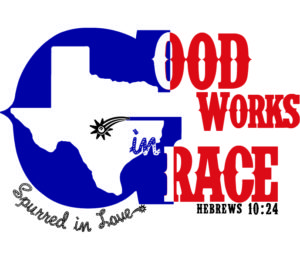 2018: The annual conference is held at T Bar M Camp and Retreat Center in New Braunfels, TX, under the theme “Good Works in Grace Spurred in Love.” Nearly 120 attended and the first diversity award grant was given that year. For the first time in several years, LOM had a gathering for executive directors. The event was held at Lutheranch (GA), in April, and attracted 31 participants. LOM entered into a partnership with ELCA Advocacy to share space and activity in the Interactive Learning Center at the ELCA Youth Gathering in June. The theme for our partnership focused on stewardship of creation. Kris Hinkeldey began as the new LOM Bookkeeper at the beginning of this year. Territory Coordinators began in 2018 we move into full implementation of the “Expanding the Capacity” initiative. Read the Executive Director’s Report for this year.
2018: The annual conference is held at T Bar M Camp and Retreat Center in New Braunfels, TX, under the theme “Good Works in Grace Spurred in Love.” Nearly 120 attended and the first diversity award grant was given that year. For the first time in several years, LOM had a gathering for executive directors. The event was held at Lutheranch (GA), in April, and attracted 31 participants. LOM entered into a partnership with ELCA Advocacy to share space and activity in the Interactive Learning Center at the ELCA Youth Gathering in June. The theme for our partnership focused on stewardship of creation. Kris Hinkeldey began as the new LOM Bookkeeper at the beginning of this year. Territory Coordinators began in 2018 we move into full implementation of the “Expanding the Capacity” initiative. Read the Executive Director’s Report for this year.
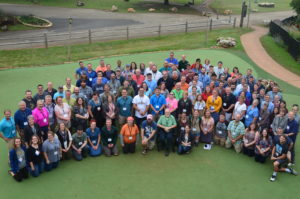
 2019:
2019:
July 5, 2019, was the 100th anniversary of Lutheran outdoor ministry. To see how we celebrated, click here.
From November 10-14, 2019, an ecumenical group of mainline denominational camp and retreat associations held the Outdoor Ministry Connection (OMC) Great Gathering at Lake Junaluska, located in the beautiful Blue Ridge Mountains of North Carolina. Under the theme of RelationSHIFT, they built relationships, discovered each other’s gifts, and equipped vital ministries to meet the emerging needs of God’s people. The event brought together innovative outdoor ministry partners of mainline denominations (about 550 people). Read the Executive Director’s Report for this year.
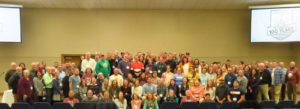
LOM Day at Lutheridge
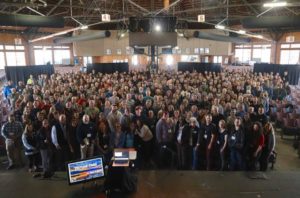
2020: LOM provided resources and support to organizations this year as they dealt with the effects of the COVID-19 pandemic. A resource page was created on our website, Zoom forums were held to check in with one another and share information, and a COVID-19 Response Team was formed. In addition, numerous podcasts were recorded to help decision makers in this difficult time. A generic video about Lutheran Outdoor Ministries was produced as well as an “I Love Camp” video that our organizations could use to promote their ministries.The first-ever Run4Camp 5K on All Saints Day, Sunday, November 1. The 17 participating camps raised over $133,000. This was a joint venture between LOM and the participants, raising money for the outdoor ministries who have endowed us with the treasures of sites and ministries that we love so much. Like most things in 2020, the Leadership Training Event went VIRTUAL during the week of November 9. Sessions were held to offer conversation, insight, learning, and connecting with others. Some had a presenter with time for questions, others were facilitated conversations by the LTE Committee. We even got it all started with an LOM Social hour complete with get-to-know-you activities and ice breakers. No LOM Conference was held in 2020. Read the Executive Director’s Report for this year.
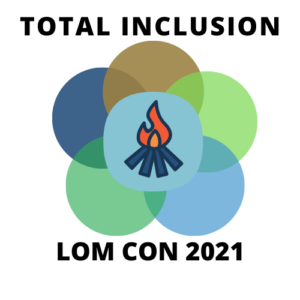 2021: The annual conference was held on November 8-12, 2021, at the Great Wolf Lodge in Bloomington, MN. The conference was inspired by the ELCA Total Inclusion grant initiative and focused on opportunities and resources as we work towards a wider and more intentional inclusion of people who have been historically marginalized in the church. In order to heal, debrief and grow through the events of the last two years, attendees were together with one another in fellowship, in prayer and worship, and in fun. The Leadership Training Event format of two tracks (program and administration) changed to an expanded program – new core curriculum topics, more time for small group conversation, an opportunity to draw in professionals from LOM as well as other denominations with strong camping programs. The LOM Camp MatchUp App went live in 2021! Camp MatchUp is a recruiting tool and way to connect with potential summer staff looking for a camp. A video was produced for use as a worship experience on the 2nd Sunday after Pentecost, June 6. The video featured outdoor ministry leaders from throughout the LOM network and emphasized our gratitude for creation. We adjusted the alignment of the LOM Territories creating four instead of five, eliminating the South-Central Territory.
2021: The annual conference was held on November 8-12, 2021, at the Great Wolf Lodge in Bloomington, MN. The conference was inspired by the ELCA Total Inclusion grant initiative and focused on opportunities and resources as we work towards a wider and more intentional inclusion of people who have been historically marginalized in the church. In order to heal, debrief and grow through the events of the last two years, attendees were together with one another in fellowship, in prayer and worship, and in fun. The Leadership Training Event format of two tracks (program and administration) changed to an expanded program – new core curriculum topics, more time for small group conversation, an opportunity to draw in professionals from LOM as well as other denominations with strong camping programs. The LOM Camp MatchUp App went live in 2021! Camp MatchUp is a recruiting tool and way to connect with potential summer staff looking for a camp. A video was produced for use as a worship experience on the 2nd Sunday after Pentecost, June 6. The video featured outdoor ministry leaders from throughout the LOM network and emphasized our gratitude for creation. We adjusted the alignment of the LOM Territories creating four instead of five, eliminating the South-Central Territory.
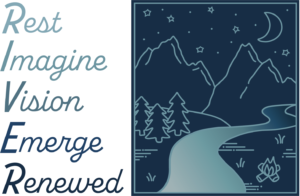 2022: The annual conference was held on November 7-11, 2022, at the Riverside Hotel in Boise, ID. The theme was “River: Rest, Imagine, Vision, Emerge, Renewed. This year was also full of Total Inclusion! work, including symposiums that took place:
2022: The annual conference was held on November 7-11, 2022, at the Riverside Hotel in Boise, ID. The theme was “River: Rest, Imagine, Vision, Emerge, Renewed. This year was also full of Total Inclusion! work, including symposiums that took place:
- East: March 21–24, Camp Nawakwa (PA). 23 participants from 13 outdoor ministry organizations, 7 resource persons.
- Eastern Midwest: April 4–7, Lutherdale (WI), 16 participants from 8 outdoor ministry organizations, 8 resource persons.
- Western Midwest: April 24–27, Luther Crest (MN), 24 participants from 15 outdoor ministry organizations, 7 resource persons.
- West: September 19–23, Lutherhaven (ID), 29 participants from 13 outdoor ministry
organizations, 8 resource persons.
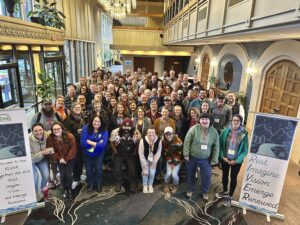
 2023: The annual conference was held on November 6-10, 2023, at The Abbey Resort in Fontana-On-Geneva Lake, WI. Under the theme of “For the Good of All,” participants learned more about how they are called to welcome all and to approach the world with a community-based focus. Chad Hershberger ended his service as contracted Communications Coordinator.
2023: The annual conference was held on November 6-10, 2023, at The Abbey Resort in Fontana-On-Geneva Lake, WI. Under the theme of “For the Good of All,” participants learned more about how they are called to welcome all and to approach the world with a community-based focus. Chad Hershberger ended his service as contracted Communications Coordinator.
